Displaying 571 - 580 of 991
This qualitative study examines the academic pathways of 33 college students with a history or foster care placement, homelessness, or both, to better understand the ways in which forms of social capital influence the transition to college and early college experiences in the US.
This presentation provides an overview of care-leaving research in South Africa.
This practice note is drawn from the discussion and outlines key considerations and a range of measures for local authorities to take as Corporate Parents to ensure consistent and effective implementation of the regulations, now established in law.
The aim of this study was to undertake a short qualitative study of four independent supported accommodation providers commissioned by local authorities for care experienced young people in Scotland.
This publication from SOS Children's Villages and CELCIS describes the two-year project 'Prepare for Leaving Care,' which aimed to "embed a child rights based culture into child protection systems which improves outcomes for children and young people in particular in the preparation for leaving care," with youth participation at the heart of all activities.
This paper documents findings from an evaluation of the Live-In Family Enhancement (LIFE) program, and recommends that this approach be expanded for use in prevention as well as reunification.
An important goal of out of home care is to prepare the family and child for reunification. Practitioners are often required to make the decision whether to reunify a foster child with their biological family. This study examines this complex reunification decision in Portugal.
In this qualitative study with four Child and Youth Care Centers in a town in the Eastern Cape, South Africa, focus groups were held with young people in care and their care workers to discuss preparation for leaving care and aftercare services and the evaluation of these by each group of participants.
This article focuses on the concept of “family” and family membership from the perspective of care leavers in Zimbabwe.
This article aims to provide a detailed account and reflection of the involvement of care leavers as peer researchers in the qualitative case study phase of a three-year, mixed method study of the transitions of young people leaving care in Northern Ireland.





